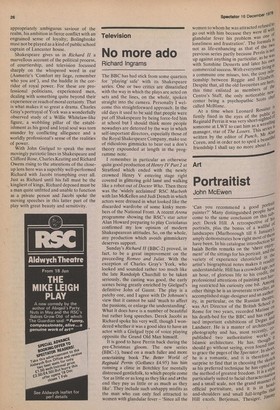Television
No more ado
Richard Ingrams
The BBC has had stick from some quarters for 'playing/ safe' with its Shakespeare series. One or two critics are dissatisfied with the way in which the plays are acted on sets and the lines, on the whole, spoken straight into the camera. Personally I welcome this straightforward approach. In the old days it used to be said that people were put off Shakespeare by being force-fed him at school but I should think more people nowadays are deterred by the way in which self-important directors, especially those of the Royal Shakespeare Company, make use of ridiculous gimmicks to bear out a don's theory expounded at length in the programme note.
I remember in particular an otherwise quite good production of Henry IV Part 2 at Stratford which ended with the newly crowned Henry V entering stage right covered in glittering gold lame and walking like a robot out of Doctor Who. Then there was the 'widely acclaimed' RSC Macbeth with Ian MeKellen and Judi Dench in which actors were dressed in what looked like the discarded wardrobe of some kinky members of the National Front. A recent Arena programme showing the RSC's star actor Alan Howard preparing to play Coriolanus confirmed my low opinion of modern Shakespearean attitudes. So, on the whole, any production which avoids gimmickery deserves support.
_Sunday's Richard II (BBC-2) proved, in fact, to be a great improvement on the preceeding Romeo and Juliet. With the exception of Charles Gray's York, who looked and sounded rather too much like the late Randolph Churchill to be taken seriously, the casting was good, the early scenes being greatly enriched by Gielgud's definitive John of Gaunt. The play is a patchy one, and I agree with Dr Johnson's view that it cannot be said 'much to affect the passions, or enlarge the understanding'. What it does have is a number of beautiful but rather long speeches. Derek Jacobi as Richard spoke his very well, though I wondered whether it was a good idea to have an actor with a Gielgud type of voice playing opposite the Grand Old Man himself.
It is good to have Perrin back during the pre-Christmas gloom. The new series (BBC-1). based on a much fuller and more entertaining book The Better World of Reginald Perrin (Gollancz £4,95) has him running a clinic in Botchley for mentally distressed gentlefolk, to which people come 'for as little or as long as they like and at the end they pay as little or as much as they like'. They include such unhappy misfits as the manwho can only feel attracted to women with glandular fever 'Since all the go out with him because they were ill othf glandular fever his problem was loneliness and frustration'. The formula 15 not as life-enhancing as that of the twot previous series partly because Perrin is flci up against anything in particular, as he via' with Sunshine Desserts and later flis, c/srn commercial success. With everyone a commune one misses, too, the cosy re':: tionship between Reggie and Elizabete. Despite that, all the old favourites are' eru the e' this time enlisted as members of Centre's Staff, the only noticeable e' rle:i comer being a psychopathic Scots Cu called McBlane. At a time when Leonard Rossiter firmly fixed in the eyes of the PublicA 09sf Reginald Perrin it was very short-sighte" someone at LWT to cast him as a "es ; manager, star of The Losers. This series written by the editor of Punch, M A1311 Coren, and in order not to spoil a beau. Iv' friendship I shall say no more about .....minomommisoo.1.11111°


































 Previous page
Previous page